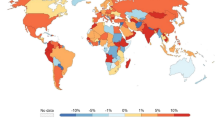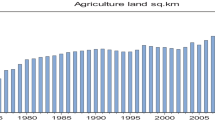Abstract
This paper examines the complementarity/substitutability of international trade and financial development in the mitigation of carbon emissions for a panel sample of 62 middle-income countries from 1991 to 2010. Applying the bias-corrected LSDV estimator, the paper yields interesting results. For the full sample, international trade and financial development play an interactive and complementary role in reducing CO2 intensity of energy use. That is, the environmental benefit of international trade is materialized only if a country has a well-developed financial market. Likewise, financial development is beneficial to the environment only in a highly open economy. Having stated these, the analysis also uncovers evidence that these results may be different across levels of income or across regions. The results bear important policy implications for the abatement of the environmental problem in the middle-income countries.


Similar content being viewed by others
Notes
As commented by a referee, by controlling for the energy use, the coefficients of the explanatory variables capture their impacts on CO2 intensity of energy use. As an additional analysis, the referee suggests excluding the energy use from the list of explanatory variables. Our main concern is, if energy use is a relevant variable, its exclusion will result in biased estimates. Indeed, when we exclude the energy use from the results, the results turn perverse with no support for even the EKC as well as for the significance of the trade and finance variables. Viewing these to be due to omitted variable bias, we retain the energy use in the model.
The standard error = \(\sqrt{{\text{var}} \left( {\theta_{1} } \right) + {\text{LTR}}^{2} {\text{var}} \left( {\theta_{3} } \right) + 2{\text{LTRcov}} \left( {\theta_{1} ,\theta_{3} } \right)}\).
A right-hand-side variable is said to be endogenous when it is correlated with the error terms. In a dynamic panel model, this so-called endogeneity problem is inherent since, by construction, the lagged dependent variable is correlated with the individual-specific effect even if other right-hand-side variables are exogenous.
Meschi and Vivarelli (2009) apply the bias-corrected LSDV estimator to a panel sample of 65 countries observed over 20 years to examine the relation between trade and inequality. Meanwhile, Huang (2010) assesses financial development implication of political institutions in a panel sample of 90 countries.
To be exact, the mitigation of environment problem as suggested by the results is through improving CO2 efficiency or, equivalently stated, reduction in CO2 intensity of energy use. See also footnote 1.
References
Abbasi F, Riaz K (2016) CO2 emissions and financial development in an emerging economy: an augmented VAR approach. Energy Policy 90:102–114
Abid M (2017) Does economic, financial and institutional developments matter for environmental quality? A comparative analysis of EU and MEA countries. J Environ Manag 188:183–194
Antweiler W, Copeland B, Taylor S (2001) Is free trade good for the environment? Am Econ Rev 91:877–908
Apergis N, Payne JE (2009) CO2 emissions, energy usage, and output in Central America. Energy Policy 37:3282–3286
Arellano M, Bond S (1991) Some tests of specification for panel data: Monte Carlo evidence and application to employment equation. Rev Econ Stud 58:277–297
Arellano M, Bover O (1995) Another look at the instrumental variable estimation of error-components models. J Econom 68:29–51
Baek J, Cho Y, Koo WW (2009) The environmental consequences of globalization: a country-specific time-series analysis. Ecol Econ 68(8–9):2255–2264
Blundell R, Bond S (1998) Initial conditions and moment restrictions in dynamic panel data models. J Econom 87:115–143
Boutabba MA (2014) The impact of financial development, income, energy and trade on carbon emissions: evidence from the Indian economy. Econ Model 40:33–41
Brambor T, Clark WR, Golder M (2006) Understanding interaction models: improving empirical analyses. Polit Anal 14(1):63–82
Bruno GSF (2005a) Approximating the bias of the LSDV estimator for dynamic unbalanced panel data models. Econ Lett 87:361–366
Bruno GSF (2005b) Estimation and inference in dynamic unbalanced panel-data models with a small number of individuals. Stata J 5(4):473–500
Bun MJG, Kiviet JF (2003) On the diminishing returns of higher order terms in asymptotic expansion of bias. Econ Lett 79:145–152
Cherniwchan J, Copeland BR, Taylor MS (2016) Trade and the environment: new methods, measurements, and results. NBER working paper no. 22636
Cole MA, Elliot RJR (2003) Determining the trade-environment composition effect: the role of capital, labor and environmental regulations. J Environ Econ Manag 46(3):363–383
Copeland BR, Taylor MS (2004) Trade, growth, and the environment. J Econ Lit 42(1):7–71
Dasgupta S, Laplante B, Mamingi N (2001) Pollution and capital markets in developing countries. J Environ Econ Manag 42:310–335
Ertugrul HM, Cetin M, Seker F, Dogan E (2016) The impact of trade openness on global carbon emissions: evidence from the top ten emitters among developing countries. Ecol Ind 67:543–555
Feeney J (1994) Goods and asset market interdependence in a risky world. Int Econ Rev 35(3):551–563
Frankel JA, Romer D (1999) Does trade cause growth? Am Econ Rev 89:379–399
Frankel JA, Rose AK (2005) Is trade good or bad for the environment? Sorting out the causality. Rev Econ Stat 87:85–91
Herwartz H, Walle YM (2014) Openness and the finance-growth nexus. J Bank Finance 48:235–247
Huang Y (2010) Political institutions and financial development: an empirical study. World Dev 38(12):1667–1677
Ibrahim MH, Law SH (2014) Social capital and CO2 emission-out relations: a panel analysis. Renew Sustain Energy Rev 29:528–534
Ibrahim MH, Law SH (2016) Institutional quality and CO2 emission–trade relations: evidence from Sub-Saharan Africa. S Afr J Econ 84(2):323–340
Jalil A, Feridun M (2011) The impact of growth, energy and financial development on the environment in China: a cointegration analysis. Energy Econ 33:284–291
Judson RA, Owen AL (1999) Estimating dynamic panel data models: a guide for macroeconomists. Econ Lett 65:9–15
Khan MA, Khan MZ, Zaman K, Irfan D, Khatab H (2014) Questing the three growth determinants: energy consumption, foreign direct investment and financial development in South Asia. Renew Energy 68:203–215
Kiviet JF (1995) On bias, inconsistency, and efficiency of various estimators in dynamic panel data models. J Econom 68:53–78
Kohler M (2013) CO2 emissions, energy consumption, income and foreign trade: a South African perspective. Energy Policy 63:1042–1050
Managi S, Hibiki A, Tsurumi T (2009) Does trade openness improve environmental quality? J Environ Econ Manag 58:346–363
Meschi E, Vivarelli M (2009) Trade and income inequality in developing countries. World Dev 37(2):287–302
Narayan S, Doyth N, Nguyen TT, Kluegel K (2016) Trade of goods and services and risk sharing ability in international equity markets: are these substitutes or complements? Int Rev Econ Finance 45:485–503
Nasir M, Rehman F (2011) Environmental Kuznets curve for carbon emissions in Pakistan: an empirical investigation. Energy Policy 39:1857–1864
Nickell S (1981) Biases in dynamic models with fixed effects. Econometrica 49:1417–1426
Ozturk I, Acaravci A (2013) The long-run and causal analysis of energy, growth, openness and financial development on carbon emissions in Turkey. Energy Econ 36:262–267
Rioja F, Valev N (2004) Finance and the sources of growth at various stages of economic development. Econ Inq 42(1):127–149
Rock MT (1996) Pollution intensity of GDP and trade policy: can the World Bank be wrong? World Dev 24(3):471–479
Sadorsky P (2010) The impact of financial development on energy consumption in emerging economies. Energy Policy 38:2528–2535
Shahbaz M, Hye QMA, Tiwari AK, Leitao NC (2013a) Economic growth, energy consumption, financial development, international trade and CO2 emissions in Indonesia. Renew Sustain Energy Rev 25:109–121
Shahbaz M, Solarin SA, Mahmood H, Arouri M (2013b) Does financial development reduce CO2 emissions in Malaysian economy? A time series analysis. Econ Model 35:145–152
Shahbaz M, Shahzad SJH, Ahmad N, Alam S (2016) Financial development and environmental quality: the way forward. Energy Policy 98:353–364
Shahbaz M, Nasreen S, Ahmed K, Hammoudeh S (2017) Trade openness-carbon emissions nexus: the importance of turning points of trade for country panels. Energy Econ 61:221–232
Shahzad SJH, Kumar RR, Zakaria M, Hurr M (2017) Carbon emission, energy consumption, trade openness and financial development in Pakistan: a revisit. Renew Sustain Energy Rev 70:185–192
Talikdar D, Meisner CM (2001) Does private sector help or hurt the environment? Evidence from carbon dioxide pollution in developing countries. World Dev 29(5):827–840
Tamazian A, Rao B (2010) Do economic, financial and institutional developments matter for environmental degradation? Evidence from transitional economies. Energy Econ 32:137–145
Tamazian A, Chousa JP, Vadlamannati C (2009) Does higher economic and financial development lead to environmental degradation? Evidence from the BRIC countries. Energy Policy 37:246–253
Taylor AM, Wilson JLF (2011) International trade and finance: complementaries in the United Kingdom 1870–1913 and the United States 1920–1930. J Int Money Finance 30:268–288
Tiwari AK, Shahbaz M, Hye QM (2013) The environmental Kuznets curve and the role of coal consumption in India: cointegration analysis in an open economy. Renew Sustain Energy Rev 18:519–527
Welsch RE, Kuh E (1977) Linear regression diagnostics. Technical report 923-77. Massachusetts Institute of Technology, Cambridge, MA
Windmeijer F (2005) A finite sample correction for the variance of linear two-step GMM estimators. J Econom 126(1):25–51
Zhang Y-J (2011) The impact of financial development on carbon emissions: an empirical analysis in China. Energy Policy 39:2197–2203
Acknowledgements
We would like to thanks the referees of the journal, who have provided very useful and constructive comments. The usual disclaimer, however, applies.
Author information
Authors and Affiliations
Corresponding author
Rights and permissions
About this article
Cite this article
Ibrahim, M.H. Trade–finance complementarity and carbon emission intensity: panel evidence from middle-income countries. Environ Syst Decis 38, 489–500 (2018). https://doi.org/10.1007/s10669-018-9675-8
Published:
Issue Date:
DOI: https://doi.org/10.1007/s10669-018-9675-8




